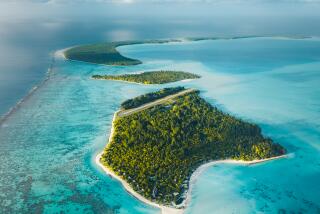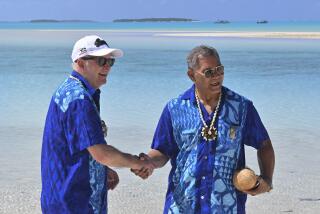A Tiny Nation Hopes It’s Not Paradise Lost
- Share via
FUNAFUTI, Tuvalu — The 40-odd faithful, Bibles in hand, drive straight onto the prison grounds in pickup trucks. No problem: The fence, more a hint than a hindrance, reaches only halfway around the tiny compound.
They catch the convicts dozing in hammocks beside the beach, on a breezy mid-Pacific morning. In T-shirts and shorts, the six men stumble into place for impromptu prayers, listen politely to the congregation’s encouraging words, reply humbly with their own words of thanks.
The good deed done, the inmates line up to shake their departing neighbors’ hands -- smiling matrons, little girls in white dresses, burly men in South Seas sarongs.
Then, back to the beach.
“We didn’t even know they were coming,” confides prisoner Lopatia Iacopo. “This is Sunday. It’s our day of rest.”
And this is Tuvalu, a place like no other.
A far-flung scattering of islands in a turquoise sea, “Too-VAH-loo” is one of the planet’s smallest and most remote nations, just west of the International Date Line, just south of the Equator.
The 9,000 Tuvaluans live on nine islands and atolls comprising 129 islets and adding up to barely 10 square miles of dry land. It’s as though half of Manhattan island was sprinkled in pieces over 468,000 square miles of ocean -- a swath the size of France and Germany combined.
Tuvalu has few resources, erratic politics, mounting pollution and a growing fear that the sea, rising because of global warming, will someday drown its flat, palmy profile into oblivion.
“Tuvalu is a very small country with a high degree of vulnerability,” the Asian Development Bank observed in a 2003 report.
Even 60 years ago, James Michener found it unpromising. “A truly dismal island,” the American author wrote of Funafuti, the main settlement, after passing through during World War II.
But bankers’ bottom lines don’t tell of the real Tuvalu, of churches full of song and weddings lasting days, of surprise visits to incarcerated sinners, of half an island turning out each dusk to play soccer or volleyball up and down the idle airport runway, their twice-a-week link to the outside world.
As for Michener’s dismal time, he must have missed Pole O’Brien’s dancing.
Old snapshots show that with her grass skirt and Polynesian beauty, the local nurse charmed American GIs at native performances in 1942 and 1943. Today at 82, shrunken and an invalid, this Irish trader’s grandchild knows that her islands, in a world full of strife, are still special.
“The people are happy,” she tells a reporter visiting her home. “If you look at them, you can see it in their happy, smiling faces.”
Where else, after all, would the prison fence not quite fence the prison in?
“No one tries to escape,” Iacopo assures a reporter. “We’re fairly treated, and so we do the same.”
“Remarkable,” U.S. development specialist Gerard A. Finin says of these islands. After a visit from his post at Honolulu’s East-West Center, he wrote that Tuvalu “is today among the most economically and socially stable small island states in the Pacific islands region.”
The former Ellice Islands colony gained independence from Britain in 1978 and dubbed itself Tuvalu, “Eight Together” in Tuvaluan, signifying the eight main settlements.
Its assets: less than $1 million in cash and a hand-me-down British ship to link the widely separated atolls. The next year, an American swindler dropped by with a tempting tale of investing in Texas real estate and relieved the naive mini-nation of $550,000 in government funds.
The Cold War saved them. In the mid-1980s, the Soviet Union offered aid money for fishing rights. To keep Moscow out, Australia, New Zealand and Britain quickly financed a Tuvalu Trust Fund of about $18 million. Those investments, mostly in Australia, prospered and topped $50 million last year, even with regular Tuvalu government withdrawals.
Tuvaluans still subsist in traditional ways: men in little skiffs fishing for tuna; families cultivating breadfruit and pulaka, a taro-like plant; coconut harvested to export its oil. Many families, in their plywood or cinderblock houses, also depend on money sent home by the one in four Tuvaluan men who work as merchant seamen throughout the world.
The islands have found new revenue sources as well. Brightly hued Tuvaluan postage stamps bring in steady income from collectors. The sale of fishing rights to Japan, the United States and other tuna-loving nations brings in even more. The Internet produced the latest moneymaker, with Tuvalu’s domain name, “.tv,” being licensed to television stations worldwide that want a “dot-TV” Web address.
Tuvalu also relies on direct foreign aid. Japan recently built a new hospital on Funafuti, and the Australians put in a landfill to begin cleaning up piles of island garbage that have nowhere to go.
Taiwan rewards Tuvalu for its diplomatic recognition, a tiny boost in Taipei’s rivalry with mainland China. It has just built government offices for Tuvalu -- a modest three-story center, but still an outsized presence on slender Funafuti, just 7 miles long and 600 yards of sand, coral and hardy pandanus trees at its widest.
Parliament still meets in an old, thatched-roof, open-air “falekaupule” nearby, and it was there on a recent steamy Tuesday that its 15 members sat down to hear, after a barefoot school choir sang “Tuvalu for God,” the national anthem, that money is short despite it all.
“We’ve been trying from the start to hold down costs and maximize our economy,” Parliament member Amasone Kilei told an onlooker. “Let me assure you, it has been very, very difficult.”
Kilei, from outlying Nui atoll, led an opposition bid last year to bring down Prime Minister Saufatu Sopoanga’s government, the latest in a series of political scuffles that gave Tuvalu four prime ministers in three years. The square-jawed Sopoanga, an ex-civil servant, survived by delaying a Parliament session until he could woo a Kilei supporter away.
Tuvalu has no political parties. It has shifting coalitions of atolls and personalities instead, with the politics focusing on neglect felt by one outer island or another. Ordinary Tuvaluans follow it all closely, tuning in to live radio feeds from Parliament, phoning in complaints about what they’ve heard.
Even amid dispute, civility rules. “We raise our voices but it’s not rowdy, as in the London Parliament,” says Apisai Ielemia, current opposition leader. “Our speaker doesn’t even have a gavel.”
Despite the political rivalries, basic policy seldom changes. In an understated tribute to a poor, improbable nation, the U.S. State Department concluded, “Tuvalu does not face serious governance issues.”
It does face a serious challenge, however.
The sea is encroaching, apparently because of climate change.
With family burial plots sitting just yards from beaches, the ocean eats away the sand. Inland, seawater seeps into pulaka growing pits.
Sopoanga’s government hopes to arrange contingency evacuation plans with New Zealand, but Tuvaluans are torn.
“I’ve been to Fiji, Australia, New Zealand. They’re nice developed countries,” a young mother, Siemai Apinelu, says after church one Sunday. “But I would miss Tuvalu’s simple, easy life.”
It’s a life that revolves around the Anglican-descended Church of Tuvalu; the simple “fusi” co-op stores that anchor each district; the local “maneapa” pavilions where ample ladies, hair crowned with flowers, play gin rummy into the evenings; the single paved road down Funafuti’s sandy spine, traversed by motorbikes, barking dogs and shoeless schoolchildren in uniforms of sky blue.
“They say Tuvalu is a paradise,” says Funafuti’s traditional chief, a sturdy 70-year-old named Siaosi Finiki. “There are no guns to make you afraid. Somebody told us that in other places, they have to lock their houses up.”
Tuvalu’s starry evenings are peaceful. “Even the drunks are quiet,” Pole O’Brien’s husband of 58 years, William Ben, says with a cackle.
But if the night doesn’t disturb the peace, the day after tomorrow -- the thought of the rising sea -- does.
“I’d like to see them move to a safe place,” Lototele Malie, 75, says of his family as he watches waves lap up just yards from his simple concrete home.
“No,” says daughter-in-law Pelise Malie, 25, two little girls in tow. “We love our country. We want to stay.”
Finiki falls back on his faith. For this Tuvaluan, abandoning this place found by seafaring ancestors 2,000 years ago is not an option.
“I don’t like the idea of leaving the island,” the chief says. “I think God has a way for us.”
More to Read
Sign up for Essential California
The most important California stories and recommendations in your inbox every morning.
You may occasionally receive promotional content from the Los Angeles Times.










